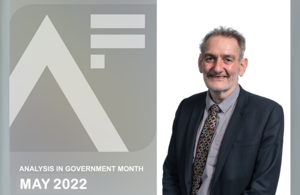Get ready for Analysis in Government Month!
News story
Head of the Analysis Function Sir Ian Diamond encourages analysts across government to get involved with Analysis in Government Month 2022.

Preparations are well underway for Analysis in Government Month 2022 and we caught up with Head of the Government Analysis Function and National Statistician, Professor Sir Ian Diamond, to find out his priorities for the month.
“Recent years have highlighted the importance of government analysis. As Head of the Government Analysis Function, I have been immensely proud of all the fantastic work undertaken by analysts working across government.
The Analysis in Government Awards in December was a brilliant opportunity to celebrate the very best of this analytical work. Many of the exemplars had a similar theme running throughout; collaboration, whether it be across teams, professions, departments, or functions. These exemplars demonstrate what can be achieved when we work together, and why collaboration features heavily in the Analysis Function vision. This is why the theme of this year’s Analysis in Government Month is #AnalysisCollaborate.
Analysis in Government Month 2022 is set to be a fantastic event. The month will feature a range of content including live events, training, blog posts, Evaluation Day and a hackathon. We want to encourage collaboration by bringing the analytical community together.
The events are open to all members of the Analysis Function, local government analysts, aspiring analysts and anyone with an interest in government analysis (such as other civil servants, academics or analysts in non-government organisations).
I encourage you to keep an eye out for the agenda and to make the most of the opportunities available to you. To keep up to date with the latest news;
If you have any specific queries about this event, please email Analysis.Function@ons.gov.uk.
Published 30 March 2022
